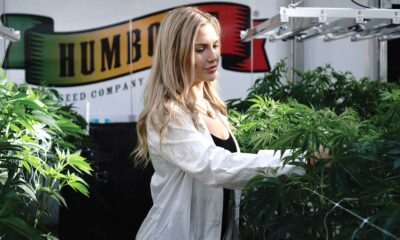
Edibles
Missy Bradley: The Challenges and Triumphs of Innovation
Ripple’s co-founder and chief marketing officer shares insights from her 10 years leading one of Colorado’s most innovative edibles manufacturers.
In the ever-evolving landscape of the cannabis industry, few stories are as compelling as that of Missy Bradley, Co-Founder and Chief Revenue Officer, of Ripple, a Colorado-based company that pioneered water-soluble THC products. From her roots in journalism to becoming a pioneer in cannabis-infused products, Bradley’s journey is filled with innovation, perseverance and the power of seizing unexpected opportunities.
Ripple has developed highly potent and efficacious products for nearly a decade, from its early THC-infused teas to its latest offering of live rosin-infused gummies. Bradley and her team have consistently pushed the boundaries of what’s possible in cannabis product development.
In this exclusive interview, Bradley offers a candid look at the challenges and triumphs of building a cannabis brand from the ground up. She shares insights on product innovation, market trends and the importance of company culture in an unconventional industry.
Cannabis Now: Tell me about your entrepreneurial journey and how you found your way to cannabis.
Missy Bradley: I started my career as a journalist. I dreamed of working in publishing, specifically magazines. My family and I moved to Colorado when my husband was offered a job here. A childhood friend wanted to start a cannabis business and needed a two-year resident, so we started talking about licensing the business. It became much more than that, and here I am, nearly 10 years later, working in cannabis.
Tell me about the growth of Ripple.
MB: We began ideating in 2014 and were fully licensed in 2016. Initially, we targeted the micro-dose, soccer mom, Whole Foods consumer. But Colorado is more of a full 10-milligram dose, recreational high market. Functional users are mixed in, but it’s challenging to build products for a small market. I still see that sort of Whole Foods functional use coming, but it’s further out than we initially thought.
Our target demographic’s biggest barrier is going into a dispensary. We come from a legacy market, and stores in the early days weren’t these big, fancy Apple store-like dispensaries you see now. We believe we’ll see wider adoption once products are available in more mainstream locations.
How has your team evolved over the years?
MB: We were a small team and remain relatively small. We now have 42 employees, with a solid handful from 2016. We founded this company with culture as a tentpole, focusing on making it a people-first organization.
You co-founded Ripple with two friends, Justin Singer and Jeremy Goldstein. What has been your experience as a woman in the industry?
MB: I’ve had a positive experience and benefited from women’s networking events and organizations like Women Grow. Our company typically employs over 50% female employees. While the industry has seen fluctuations in gender representation, I’ve found the cannabis space to have more gender equality compared to other male-dominated industries.
What’s been the biggest lesson you’ve learned as a co-founder?
MB: To stay the course, set a sound strategy and not be deterred. It’s easy in this market to try to be everything to everybody, but that can hurt the business. We’ve been deliberate about what we’re going to be and what we’re not going to be.
You must have quite a few “a-ha” moments from your ten years in cannabis. Do any standout?
MB: Receiving emails from people with illnesses or feeding tubes who found our products helpful is extremely rewarding.
What’s the first thing you think of when I say Ripple has been operating for over a decade?
MB: That we’re still here! We didn’t know what we were making when we created Ripple. It was innovative then and it’s probably on its 10th iteration. We continue to find ways to improve the product, making it leaps and bounds better than when we started.
What were some of the biggest hurdles you faced initially?
MB: Creating flavor profiles. Our first iterations of Ripple were strain-specific, dealing with all the associated terpenes while trying to make a flavorless product. We couldn’t source the same inputs from batch to batch, so the flavor profile would change. This prompted our move to distillate for Ripple products.

Ripple was one of the first companies to understand how to make THC water-soluble. Can you tell me more about that process?
MB: Keith, our head of R&D, had 20 years of experience at Mars Food. Making water-phobic substances water-soluble was standard in the food world. Applying this to THC for a product that didn’t yet exist was groundbreaking. We always looked at ourselves as a food company first that happened to be using cannabis as an ingredient.
We’ve conducted clinical studies with Colorado State University to measure THC blood absorption rates in humans. These studies allow us to confidently state that our products enter the bloodstream within 10 minutes, reach peak effects around 45 minutes and typically last about two hours. We’ve tested various ingredient combinations to understand how different carriers affect absorption speed. This research is crucial for controlling our products and ensuring consumer safety. Given our focus on precise particle size control and rigorous testing, we avoid using the term “nanoemulsification” due to its potential safety concerns and lack of standardization in the industry.
Would you consider teaming up with Colorado State again for more tests?
MB: We offer our product for free to any researcher studying cannabis. We’ve provided samples for various trials and studies to better understand how it works in the body, not just with Colorado State but with other universities.
Did you partner with any other manufacturers from the start, or did you create everything yourself?
MB: We created everything ourselves, primarily out of necessity due to licensing regulations in Colorado. Everything had to be done within the building. Our initial processes were very hands-on and labor-intensive.
As well as being a co-founder, you’re Ripple’s Chief Revenue Officer, how do you approach advertising, given the limitations the cannabis industry faces in traditional marketing strategies?
MB: We’ve tried various marketing avenues but found that educating budtenders is the most effective use of our marketing dollars. We focus on educating them about our products and building relationships. We also continuously iterate on our products to ensure we’re the best in the market.
You’ve introduced new product lines to your offerings, including live rosin. What was the impetus for applying it?
MB: We had finally reached a point where we understood our products and market. We created a product under the Ripple brand that spoke to our core consumers while offering the added benefit of the entourage effect. The live rosin product came after launching our Rip Sticks, which involved a new manufacturing process for creating a flavored powder product.
What’s next for Ripple?
MB: We’re focusing on minor cannabinoids and how they can fit into our current products. We can isolate more of these compounds with improved extraction technology and better understand their effects. We’re cautious about incorporating new elements until we fully comprehend their purpose.
Ripple is available in four states: Colorado, New Mexico, Oklahoma and Mississippi. Any plans for further expansion?
MB: We approach licensing cautiously. We’re potentially expanding to two more in the next year. Our focus is on growing our footprint in existing markets, emphasizing education for consumers and industry professionals.
What’s your favorite part about working in the cannabis space?
MB: The people, both within our company and the broader industry. It’s a fun environment where we get to make “adult candy.” The cannabis community has a unique vibe and it’s exciting to be part of an industry where you can build long-lasting relationships.
What’s your prediction for the industry in the next five years, both at state and federal levels? What are your thoughts on Schedule III?
MB: While I prefer descheduling over rescheduling, any movement in that direction is positive for the industry. I hope to see interstate transportation of products, unified regulations across states and national regulatory standards for labs and products.
Any advice for those looking to enter the industry?
MB: Find brands, products or companies you love and reach out. Many people in the industry are willing to talk and help newcomers because they’re excited about others’ interest in cannabis.























